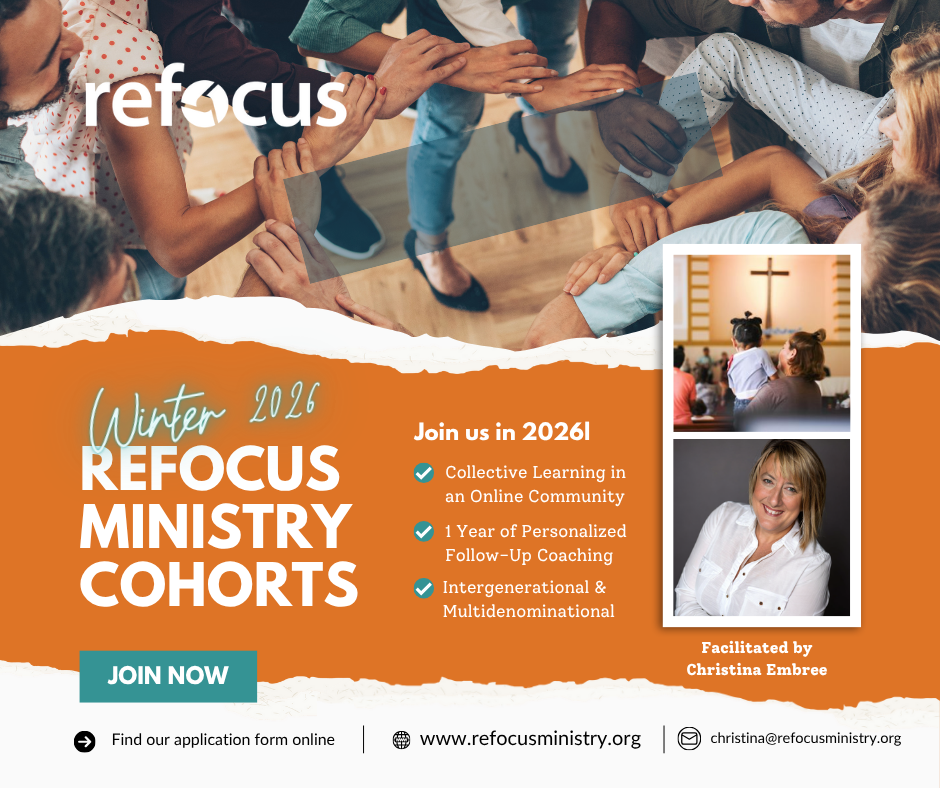Community. It’s a buzz word when it comes to church. If often shows up in mission statement and vision boards. But what do we mean by “community?” When we talk about community, we bring with us a lifetime of assumptions and experiences that have formed our understanding of the word. Marvin Minsky once referred words like “community” or “ministry” as suitcase words—words that carry personal meanings to them so that we often need to unpack them before we can use them well.
So, when we hear people talk about “intergenerational community” or “intergenerational ministry” what do we mean by that? For our purposes here, let’s establish some working definitions:
- Intergenerational community is a gathered group of multiple generations in meaningful relationships with one another, where all have the opportunity to both teach and to learn.
- Intergenerational ministry is the intentional culture of a church that creates space for meaningful connections across generations for the purpose of discipleship, faith formation, and community building.
There is a common misconception that intergenerational ministry is simply a revamped form of children’s ministry or family ministry. Though these can be natural partners, intergenerational ministry encompasses the whole church—all generations—woven together in a communal and corporate life. It is less a program of the church and more a characteristic of the church, a way of being the body of Christ together.

Not too long ago, the term “intergenerational ministry” was only referred to in smaller, more academic circles. But as more and more research has come out revealing the importance of connecting generations in meaningful relationships, more and more churches are looking to embrace a more intergenerational approach to church. Unfortunately, most of our programming, resources, and traditions tend to keep the ages and generations separated rather than offering opportunities to come together.
But where to start? A full-program revamp is hardly possible for most churches. But there are some simple steps we can do as we plan our events and consider our programming for the future.
One simple step is to think ahead about who will be present in a particular space or place and think about how we can make it “intergenerational.” A good rule of thumb is to think Past, Present, Future: at least three generations together—the older generation representing the past, the middle generation representing the present, and the youngest generation representing the future. That balance gives depth to our relationships, grounding us in history, connecting us in the present, and giving hope for what is to come.
We all know that simply gathering people of different ages in the same room does not create community. True intergenerational connection requires cultivating meaningful relationships and creating opportunities where each person can be both teacher and student. Each generation has unique gifts to contribute and unique needs that can only be met in relationship with others.
- Older generations bring faithful testimonies, treasured worship practices, and disciplines that have sustained communities for decades. Their unique need is to leave a legacy and to be needed; isolation from younger generations denies them this vital expression of faith. (PAST)
- Middle generations carry experience with both past traditions and current culture, often bridging communication between worlds. Their need is for intimacy and deeper relationships; without them, they risk withdrawing into isolation. (PRESENT)
- Younger generations offer fresh understanding of timeless truths. Their needs are deeply embedded in identity—to know they belong and that their contributions matter. Safe, fun environments are good, but what they long for are participatory environments where they are integral to the life of the church.
So how do we move beyond getting everyone into a room together and into practices that allow intergenerational community to flourish?
Here are a few practical examples:
- Intergenerational Intercessory Prayer – Programs like The Pray For Me Campaign intentionally link children and youth with prayer partners from older generations. Relationships that begin in prayer often ripple outward into deeper intergenerational bonds across the church.
- Inviting Children and Youth in Worship Roles – Worship is more than singing. Hospitality, prayer, generosity, and service are all forms of worship. Giving young people tangible roles in these areas not only helps them grow in faith but also allows the larger congregation to know them by name and story.
- Serving and Celebrating Together: Community Beyond the Building – The church is people, not programs. Something as simple as a bulletin board highlighting youth sports, recitals, retirements, or anniversaries can create opportunities for showing up in one another’s lives. Engaging in service projects where multiple ages work side-by-side with each other can bridge generational gaps. Celebrations of milestones across generations help knit the community together outside the pews.
Each piece of intergenerational ministry—gathering together, building meaningful relationships, teaching and learning across generations—matters on its own. But taken together, they create something larger: a rich, resilient, Christ-centered community that is more than an event and more than a program. At its best, intergenerational ministry is not just what the church does but who the church is: the body of Christ, living together as past, present, and future, teaching and learning, giving and receiving, worshiping and serving as one family in God.

In this season, we are invited to wait together—to tell the stories, light the candles, and share the hope, peace, joy, and love that prepare our hearts for Christ’s coming.
To help you and your community live into that sacred anticipation, ReFocus has created an Advent Photo Scavenger Hunt—a playful, intergenerational way to experience the wonder of the season as you seek out glimpses of God’s presence in everyday life.
Download here (unlimited copies for your church family)

Why should YOU join a ReFocus Cohort?
Because ministry was never meant to be done alone.
ReFocus Cohorts connect intergenerational ministry leaders for encouragement, collaboration, and growth — between conferences, across generations, and in real life.
~Learn together
~Problem-solve real challenges
~Pray and encourage one another
~Stay inspired all year long
~Become a ReFocus Coach and help others
Your ministry matters. Don’t do it in isolation — do it in community. Our Winter 2026 ReFocus Cohort is forming now – we will begin meeting in January and be finished by Easter. Contact us today to find out how you can be involved!
**Did you attend Generations Together? You automatically qualify for a $200 scholarship for any 2026 ReFocus Cohort!
About the Author

Christina Embree is the founder and director of ReFocus Ministry. She holds a masters in ministry focused on Children, Youth, and Family Ministry and a doctorate in spiritual formation with a focus on age segregation and intergenerational ministry. In addition to coaching churches of multiple denominations and traditions all around the globe, Christina serves as the Minister of Generational Discipleship for the Great Lakes Conference of the Brethren in Christ and as a pastor at Plowshares Brethren in Christ in Lexington, Kentucky. She is widely recognized as a speaker and author in the areas of generational discipleship, intergenerational ministry, and family ministry. As the mother of three children, she is familiar with the challenges of faith at home and pastoral ministry. She along with her husband Luke share a love for the church, their community, and the global work of peace and restoration through Jesus.


